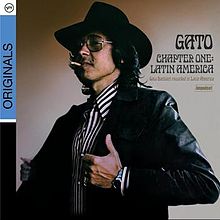Chapter One: Latin America
- Chapter One: Latin America
-
Chapter One: Latin America is a 1973 album by Gato Barbieri. It was recorded and issued in 1973 on Impulse! Records as AS-9248. The album was re-released in 1997 as part of Latino America, a double CD that also included the album Chapter Two: Hasta Siempre along with unreleased tracks.[1]
Track listing
- "Encuentros" 12:28
- "India" 8:58
- "La China Leoncia Arreo La Correntinada Trajo Entre La Muchachada La Flor De La Juventud" 13:33
- "Nunca Mas" 5:25
- "To Be Continued" 2:27
Tracks 1-4 recorded at Music Hall, S.A.C.I.S.I, Buenos Aires; track 5 recorded at Odeon Studios, Rio de Janeiro.
Personnel
- Gato Barbieri - tenor saxophone (1-5)
- Raul Mercado - quena (1, 2, 3)
- Amadeo Monges - Indian harp (1, 2, 3)
- Ricardo Lew - Electric guitar (1, 3)
- Quelo Palacios - acoustic guitar (1, 2, 3)
- Isoca Fumero - charango (1, 3)
- Antonio Pantoja - anapa, erke, siku, quena, erkencho (1, 2, 3)
- Adalberto Cevasco - Fender bass (1, 2, 3, 4)
- Dino Saluzzi - bandoneon (4)
- Domingo Cura - bombo indio (Indian drums) (1, 2, 3)
- Pocho Lapouble - drums (1, 3)
- Jorge Padin - percussion (1, 3)
- El Zurdo Roizner - percussion (1, 2, 3)
- Osvaldo Bellingieri - piano (4)
References
Categories: - 1973 albums
- Impulse! Records albums
- 1970s jazz album stubs
Wikimedia Foundation.
2010.
Look at other dictionaries:
Chinatowns in Latin America — Chinatown Chinatowns in Africa Chinatowns in Asia Chinatowns in Europe Chinatowns in Latin America Chinatowns in the Middle East Chinatowns in Canada and the United States … Wikipedia
History of the Jews in Latin America — The history of the Jews in the Americas dates back to Christopher Columbus and his first cross Atlantic voyage on August 3, 1492, when he left Spain and eventually discovered the New World. His date of departure was also the day on which the… … Wikipedia
One Hundred Years of Solitude — … Wikipedia
Latin Trade — is a monthly magazine covering global business in Latin America and the Caribbean. Similar to Forbes and Fortune Magazine in coverage, the magazine was founded in 1993 and now publishes 87,000 copies [http://www.bpaww.com 1] each month in Spanish … Wikipedia
Latin American literature — Introduction the national literatures of the Spanish speaking countries of the Western Hemisphere. Historically, it also includes the literary expression of the highly developed American Indian civilizations conquered by the Spaniards. Over … Universalium
Latin American Boom — The Latin American Boom ( Boom Latinoamericano ) was a literary movement of the 1960s and 1970s when the work of a group of relatively young Latin American novelists became widely circulated in Europe and throughout the world. The Boom is most… … Wikipedia
Latin Kings (gang) — Infobox Criminal organization name = Latin King and Queen Nation caption = founded on = 1940 1950 founding location = Chicago founded by = years active = 1940 present territory = Chicago and NYC and 38 colors = black and goldstates and Mexico,… … Wikipedia
Latin American music — Introduction musical traditions of Mexico, Central America, and the portions of South America and the Caribbean colonized by the Spanish and the Portuguese. These traditions reflect the distinctive mixtures of Native American, African, and… … Universalium
North America — North American redirects here. For other uses, see North American (disambiguation). North America Area … Wikipedia
Afro-Latin American — Infobox Ethnic group group = Afro Latin American caption = Notable Afro Latin Americans Ronaldinho·Pelé·Arturo Alfonso Schomburg·Gabino Ezeiza pop = Sub Saharan African >100,000,000 Latin Americans *Figure excludes Belize, Guyana, Suriname, or… … Wikipedia

